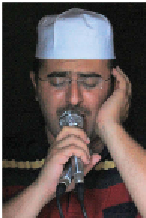Travel Reference
In-Depth Information
While the call to prayer sounds spooky
to many Americans, I fi nd that with
some understanding it becomes beau-
tiful. Traditionally, just before the sun
rises, an imam (prayer leader) stares
at his arm. When he can tell a gray hair
from a black one, it's time to call his
community to prayer. While quality and
warble varies, across Islam the Arabic
words of the call to prayer are exactly
the same. The fi rst call to prayer of the
day starts with an extra line:
Big mosques
have a trained pro-
fessional singer for a
muezzin.
Many tiny
mosques can't af ord
a real
muezzin,
so the
imam himself does
the call to prayer.
The qualitative dif er-
ence can be obvious.
Invariably, my hotel seems to be within
earshot of fi ve or six mosques, which
creates quite a cacophony.
My challenge is to hear the Mus-
lim call to prayer as a beautiful form
of praise that sweeps across the
globe—from Malaysia across Pakistan,
Arabia, and Turkey to Morocco and
then to America—like a stadium wave,
undulating exactly as fast as the earth
turns…fi ve times a day.
Praying is better than sleeping
God is great (Allahhhhhh hu akbar…)
I witness there is no other God but Allah
I witness Muhammad is Allah's prophet
Come join the prayer
Come to be saved
God is great...God is great
There is no other God but Allah.
Prayer services in a mosque are usually gender-segregated. h e act of
praying is quite physical, and—as a practical matter of respect for women (and
less distraction for both sexes)—they typically worship apart from the men.
Just as pre-Vatican II Catholicism embraced Latin (for tradition, unifor-
mity, and so all could relate and worship together anywhere, anytime), Islam
embraces Arabic. Turks recently experimented by doing the call to prayer in
Turkish, but they switched back to the traditional Arabic.
h e Quran teaches that Abraham was a good submitter (to the will of
God). h e word for submitter is “Muslim”—derived from
Islam
(“submit”)
with a
Mu-
(“one who”). So a Muslim is, literally, “one who submits.”
Wherever I travel, having just a basic grasp of the dominant local religion
makes the people and traditions I encounter more meaningful and enjoy-
able. Exploring Muslim countries leaves me with memories of the charming
conviviality of neighborhoods spilling into the streets. Like Christmas is a
fun time to enjoy the people energy of a Christian culture, Ramadan is a
particularly fun and vibrant time to be among Muslims. My visits to places
like Turkey, Morocco, and Iran (described in Chapter 8) have shown me how
travel takes the fear out of foreign ways.


















































































